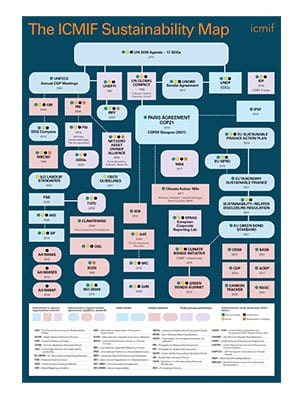Sustainability, the undertaking of activities which demonstrate forward-looking social, environmental and ethical responsibility, is increasingly seen by ICMIF members as essential to the long-term success of their respective businesses as it plays an important role in generating value for an organisation. This success is then shared within annual integrated reports or as a separate sustainability report.
ICMIF members that produce such reports tell us they find it very valuable because it provides a comprehensive picture of the organisation for a broad range of stakeholders. They also recognise that social issues are increasingly important to their business and to society.
Some ICMIF members started issuing sustainability reports (also known as CSR or social reports) more than a decade ago. This, in turn, inspired an ICMIF report Measuring and Reporting Sustainability: A guide for Mutual and Cooperative Insurers that clearly demonstrated that, more than a public relations exercise, sustainability provides the opportunity to demonstrate the company’s ethos and demonstrate how its values align to those of policyholders and society.
Today, some of our members are looking to integrate the United Nations’ (UN) Sustainable Development Goals (SDGs) into their strategy, by strengthening the links between their insurance business and the SDGs and using impact measurement frameworks.
The SDGs are a key component of the UN 2030 Agenda for Sustainable Development and seen by many as a blueprint for human development. It is hoped that the Goals will be reached by 2030 which would result in ‘prosperity for all on a healthy planet’.
Since the adoption of both the SDGs and the Paris Agreement of 2015 a wide array of sustainability initiatives, networks, platforms, coalitions, commitments and pledges have emerged, transforming the finance ecosystem at all levels towards delivering a sustainable economy.
What is the ICMIF Sustainability Map and how will it benefit members?
We have prepared a Sustainability Map for our members to use as a reference guide to the many organisations and bodies working in the field of sustainability and responsible finance and we invite our members to review the map and engage with ICMIF on how the information shown can help them with their strategic goals and ESG aims.
The Map lays out the evolving sustainability ecosystem through the main sustainability initiatives or partnerships that have emerged at the international, regional and national levels.
ICMIF and some of its members are already engaged with the various entities shown on the Sustainability Map. The ICMIF secretariat will be happy to discuss the map with the member organisations who wish to learn more about the organisations and frameworks to further their sustainability work and increase their levels of responsible/sustainable investments. We can guide members and facilitate introductions with any of the entities shown and/or with ICMIF members who are already engaging with the various initiatives shown on the Map.
The Sustainability Map shows the United Nations 2030 Agenda for Sustainable Development with its 17 Sustainable Development Goals at the top as it provides an overarching framework for all existing initiatives in sustainability. Underneath, you will find the essential bodies, guidelines or partnerships – some with connecting links between them – that we believe deliver the most effective results and which are already endorsed by some ICMIF members.
We have shown a distinction between public initiatives, private initiatives and joint public-private sector ones. We have also separated the international/regional organisations from international/regional treaties, regulation and standards.
For each entry, a colour coding indicates whether the organisation or the guidelines relate to environmental, social, governance or responsible investing issues.
Many of the selected initiatives are focused on reporting and the disclosure of information relating to environmental factors, which are currently the most critical priority for policy and regulatory action, but the social and governance aspects are equally important.
The Map will be revised regularly as we continue identifying and mapping the evolving networks according to their impact objectives.
For more information please contact Catherine Hock, Vice-President, International Relations, ICMIF at [email protected]






